College+of+Engineering
-
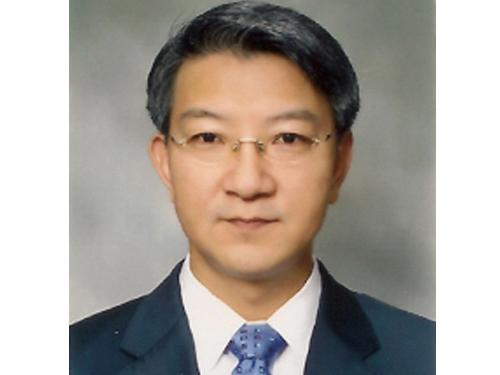 Distinguished Professor Sang Yup Lee Accepts an Honorary Professorship at Beijing University of Chemical Technology
Distinguished Professor Sang Yup Lee of the Department of Chemical and Biomolecular Engineering at KAIST has been appointed an honorary professor at Beijing University of Chemical Technology (BUCT). Founded in 1958, BUCT is one of the outstanding universities in mainland China, especially in chemistry studies.
In addition to the Chinese Academy of Sciences (2012), Shanghai Jiao Tong University (2013), Wuhan University (2014), and Hebei University of Technology (2014), this is the fifth honorary professorship Professor Lee has received from higher education institutions in China.
Professor Lee was recognized for his pioneering research in systems metabolic engineering of microorganisms necessary for the development of green chemical industries. He succeeded in producing succinic acid through bacterial fermentation and engineering plastic raw materials in the most effective and economical method for the first time in the world. Professor Lee also developed polylactic acid, a bio-based polymer that allows plastics to be produced through natural and renewable resources, as well as the microbial production of alkanes, an alternative to gasoline that can be produced from fatty acids.
Professor Lee has been actively working as a member of a group of global leaders supported by the World Economic Forum (WEF), serving as the Chairman of the Future of Chemicals, Advanced Materials & Biotechnology, Global Agenda Councils, WEF.
2014.11.13 View 12883
Distinguished Professor Sang Yup Lee Accepts an Honorary Professorship at Beijing University of Chemical Technology
Distinguished Professor Sang Yup Lee of the Department of Chemical and Biomolecular Engineering at KAIST has been appointed an honorary professor at Beijing University of Chemical Technology (BUCT). Founded in 1958, BUCT is one of the outstanding universities in mainland China, especially in chemistry studies.
In addition to the Chinese Academy of Sciences (2012), Shanghai Jiao Tong University (2013), Wuhan University (2014), and Hebei University of Technology (2014), this is the fifth honorary professorship Professor Lee has received from higher education institutions in China.
Professor Lee was recognized for his pioneering research in systems metabolic engineering of microorganisms necessary for the development of green chemical industries. He succeeded in producing succinic acid through bacterial fermentation and engineering plastic raw materials in the most effective and economical method for the first time in the world. Professor Lee also developed polylactic acid, a bio-based polymer that allows plastics to be produced through natural and renewable resources, as well as the microbial production of alkanes, an alternative to gasoline that can be produced from fatty acids.
Professor Lee has been actively working as a member of a group of global leaders supported by the World Economic Forum (WEF), serving as the Chairman of the Future of Chemicals, Advanced Materials & Biotechnology, Global Agenda Councils, WEF.
2014.11.13 View 12883 -
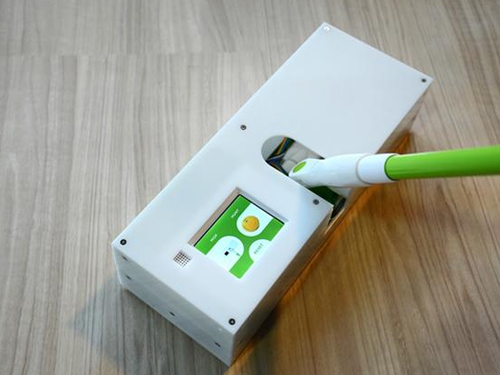 A KAIST Student Team Wins the ACM UIST 2014 Student Innovation Contest
A KAIST team consisted of students from the Departments of Industrial Design and Computer Science participated in the ACM UIST 2014 Student Innovation Contest and received 1st Prize in the category of People’s Choice.
The Association for Computing Machinery (ACM) Symposium on User Interface Software and Technology (UIST) is an international forum to promote innovations in human-computer interfaces, which takes place annually and is sponsored by ACM Special Interest Groups on Computer-Human Interaction (SIGCHI) and Computer Graphics (SIGGRAPH). The ACM UIST conference brings together professionals in the fields of graphical and web-user interfaces, tangible and ubiquitous computing, virtual and augmented reality, multimedia, and input and output devices.
The Student Innovation Contest has been held during the UIST conference since 2009 to innovate new interactions on state-of-the-art hardware. The participating students were given with the hardware platform to build on—this year, it was Kinoma Create, a JavaScript-powered construction kit that allows makers, professional product designers, and web developers to create personal projects, consumer electronics, and "Internet of Things" prototypes. Contestants demonstrated their creations on household interfaces, and two winners in each of three categories -- Most Creative, Most Useful, and the People’s Choice -- were awarded.
Utilizing Kinoma Create, which came with a built-in touchscreen, WiFi, Bluetooth, a front-facing sensor connector, and a 50-pin rear sensor dock, the KAIST team developed a “smart mop,” transforming the irksome task of cleaning into a fun game. The smart mop identifies target dirt and shows its location on the display built in the rod of a mop. If the user turns on a game mode, then winning scores are gained wherever the target dirt is cleaned.
The People’s Choice award was decided by conference attendees, and they voted the smart mop as their most favorite project.
Professor Tek-Jin Nam of the Department of Industrial Design at KAIST, who advised the students, said, "A total of 24 teams from such prestigious universities as Carnegie Mellon University, Georgia Institute of Technology, and the University of Tokyo joined the contest, and we are pleased with the good results. Many people, in fact, praised the integration of creativity and technical excellence our have shown through the smart mop.”
Team KAIST: pictured from right to left, Sun-Jun Kim, Se-Jin Kim, and Han-Jong Kim
The Smart Mop can clean the floor and offer users a fun game.
2014.11.12 View 12581
A KAIST Student Team Wins the ACM UIST 2014 Student Innovation Contest
A KAIST team consisted of students from the Departments of Industrial Design and Computer Science participated in the ACM UIST 2014 Student Innovation Contest and received 1st Prize in the category of People’s Choice.
The Association for Computing Machinery (ACM) Symposium on User Interface Software and Technology (UIST) is an international forum to promote innovations in human-computer interfaces, which takes place annually and is sponsored by ACM Special Interest Groups on Computer-Human Interaction (SIGCHI) and Computer Graphics (SIGGRAPH). The ACM UIST conference brings together professionals in the fields of graphical and web-user interfaces, tangible and ubiquitous computing, virtual and augmented reality, multimedia, and input and output devices.
The Student Innovation Contest has been held during the UIST conference since 2009 to innovate new interactions on state-of-the-art hardware. The participating students were given with the hardware platform to build on—this year, it was Kinoma Create, a JavaScript-powered construction kit that allows makers, professional product designers, and web developers to create personal projects, consumer electronics, and "Internet of Things" prototypes. Contestants demonstrated their creations on household interfaces, and two winners in each of three categories -- Most Creative, Most Useful, and the People’s Choice -- were awarded.
Utilizing Kinoma Create, which came with a built-in touchscreen, WiFi, Bluetooth, a front-facing sensor connector, and a 50-pin rear sensor dock, the KAIST team developed a “smart mop,” transforming the irksome task of cleaning into a fun game. The smart mop identifies target dirt and shows its location on the display built in the rod of a mop. If the user turns on a game mode, then winning scores are gained wherever the target dirt is cleaned.
The People’s Choice award was decided by conference attendees, and they voted the smart mop as their most favorite project.
Professor Tek-Jin Nam of the Department of Industrial Design at KAIST, who advised the students, said, "A total of 24 teams from such prestigious universities as Carnegie Mellon University, Georgia Institute of Technology, and the University of Tokyo joined the contest, and we are pleased with the good results. Many people, in fact, praised the integration of creativity and technical excellence our have shown through the smart mop.”
Team KAIST: pictured from right to left, Sun-Jun Kim, Se-Jin Kim, and Han-Jong Kim
The Smart Mop can clean the floor and offer users a fun game.
2014.11.12 View 12581 -
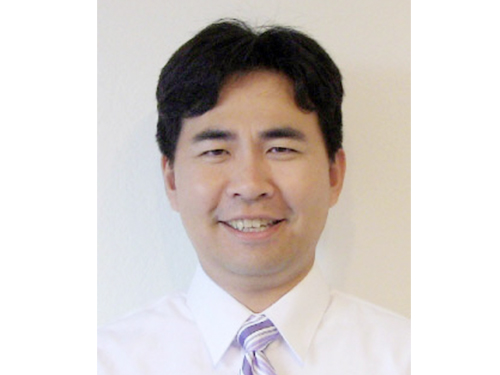 Professor Sung-Yong Kim Receives the Young Scientist Award
Professor Sung-Yong Kim of the Department of Ocean Systems Engineering at KAIST received the Young Scientist Award for 2014 conferred by the Korean Society of Oceanography (KSO). The award was presented at the KSO’s fall conference that took place on November 6, 2014 at the campus of the Naval Academy of the Republic of Korea in Jinhae.
Professor Kim has been recognized for his outstanding research in coastal oceanography and environmental fluid mechanics. His research papers are frequently published in prestigious journals such as the Journal of Geophysical Research-Oceans by the American Geophysical Union.
2014.11.11 View 8583
Professor Sung-Yong Kim Receives the Young Scientist Award
Professor Sung-Yong Kim of the Department of Ocean Systems Engineering at KAIST received the Young Scientist Award for 2014 conferred by the Korean Society of Oceanography (KSO). The award was presented at the KSO’s fall conference that took place on November 6, 2014 at the campus of the Naval Academy of the Republic of Korea in Jinhae.
Professor Kim has been recognized for his outstanding research in coastal oceanography and environmental fluid mechanics. His research papers are frequently published in prestigious journals such as the Journal of Geophysical Research-Oceans by the American Geophysical Union.
2014.11.11 View 8583 -
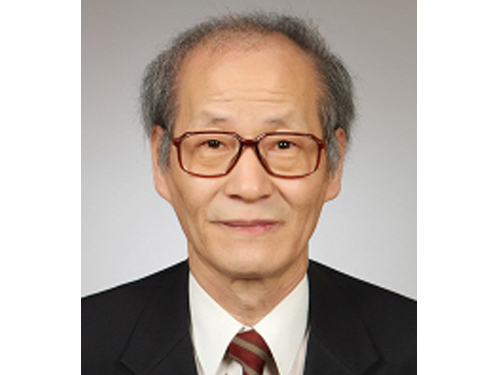 Professor Joong-Keun Park Receives SeAH Heam Academic Award
Professor Joong-Keun Park of the Department of Materials Science and Engineering at KAIST received an award from SeAH Steel Corp. in recognition of his academic achievements in the field of metallic and materials engineering.
The award was presented at the 2014 Fall Conference of the Korean Institute of Metals and Materials which took place on October 22-24 at the Kangwon Land Convention Hotel.
The award, called “SeAH Heam Academic Award,” is given annually to a scholar who has contributed to the development of new metal and polymer composite materials and its related field in Korea. Following the award ceremony, Professor Park gave a keynote speech on ferrous metals for automotive materials.
2014.11.04 View 8837
Professor Joong-Keun Park Receives SeAH Heam Academic Award
Professor Joong-Keun Park of the Department of Materials Science and Engineering at KAIST received an award from SeAH Steel Corp. in recognition of his academic achievements in the field of metallic and materials engineering.
The award was presented at the 2014 Fall Conference of the Korean Institute of Metals and Materials which took place on October 22-24 at the Kangwon Land Convention Hotel.
The award, called “SeAH Heam Academic Award,” is given annually to a scholar who has contributed to the development of new metal and polymer composite materials and its related field in Korea. Following the award ceremony, Professor Park gave a keynote speech on ferrous metals for automotive materials.
2014.11.04 View 8837 -
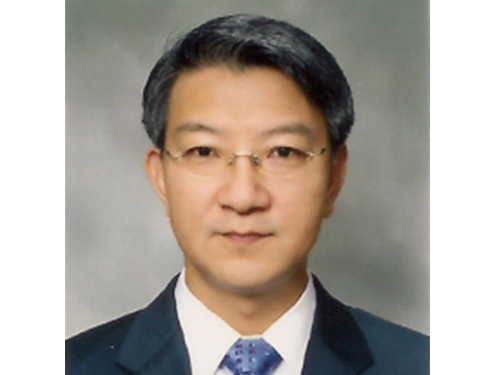 Wuhan University, China, Appoints Distinguished Professor Sang Yup Lee as Honorary Professor
Sang Yup Lee, Distinguished Professor of the Department of Chemical and Biomolecular Engineering at KAIST, has been appointed an honorary professor at Wuhan University in Hubei Province, China. This is the third time that Professor Lee has received an honorary professorship from Chinese academic institutions. The Chinese Academy of Sciences appointed him an honorary professor in 2012, and Shanghai Jia Tong University asked him to serve as an advisory professor in 2013, respectively.
Professor Lee was recognized for his pioneering research in systems metabolic engineering of microorganisms necessary for the development of green chemical industries. He succeeded in producing succinic acid through bacterial fermentation and engineering plastic raw materials in the most effective and economical method for the first time in the world. Professor Lee also developed polylactic acid, a bio-based polymer that allows plastics to be produced through natural and renewable resources, as well as the microbial production of alkanes, an alternative to gasoline that can be produced from fatty acids.
Professor Lee has been actively working as a member of a group of global leaders supported by the World Economic Forum (WEF), serving the Chairman of the Future of Chemicals, Advanced Materials & Biotechnology, Global Agenda Councils, WEF.
Wuhan University is a comprehensive and key national university selected by the Chinese government as a major recipient of state funding for research. It is also known as one of the most beautiful campuses in China.
2014.10.20 View 10510
Wuhan University, China, Appoints Distinguished Professor Sang Yup Lee as Honorary Professor
Sang Yup Lee, Distinguished Professor of the Department of Chemical and Biomolecular Engineering at KAIST, has been appointed an honorary professor at Wuhan University in Hubei Province, China. This is the third time that Professor Lee has received an honorary professorship from Chinese academic institutions. The Chinese Academy of Sciences appointed him an honorary professor in 2012, and Shanghai Jia Tong University asked him to serve as an advisory professor in 2013, respectively.
Professor Lee was recognized for his pioneering research in systems metabolic engineering of microorganisms necessary for the development of green chemical industries. He succeeded in producing succinic acid through bacterial fermentation and engineering plastic raw materials in the most effective and economical method for the first time in the world. Professor Lee also developed polylactic acid, a bio-based polymer that allows plastics to be produced through natural and renewable resources, as well as the microbial production of alkanes, an alternative to gasoline that can be produced from fatty acids.
Professor Lee has been actively working as a member of a group of global leaders supported by the World Economic Forum (WEF), serving the Chairman of the Future of Chemicals, Advanced Materials & Biotechnology, Global Agenda Councils, WEF.
Wuhan University is a comprehensive and key national university selected by the Chinese government as a major recipient of state funding for research. It is also known as one of the most beautiful campuses in China.
2014.10.20 View 10510 -
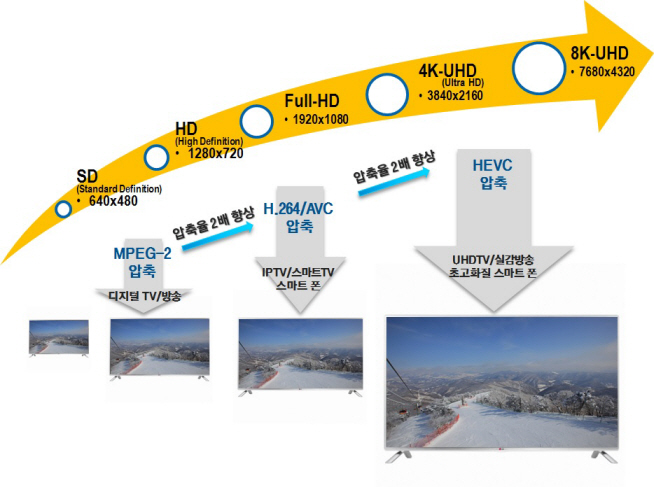 KAIST Registers an Internationally Recognized Standard Patent
A video compression technology, jointly developed by Professor Mun-Chul Kim of the Department of Electrical Engineering at KAIST, the Electronics and Telecommunications Research Institute (ETRI), and the Korean Broadcasting System (KBS), is registered internationally as the standard patent in the next-generation High Efficiency Video Coding (HEVC).
HEVC (H.265) is an international technology standard that compresses large image data for Ultra High Definition (UHD) televisions and smartphones. It has the twice the compression efficiency as that of H.264/AVC which is most commonly used for processing full HD sources. This means that it is able to compress a video file to half the size while maintaining the same image quality.
Although the related market is at a nascent stage, HEVC technology has already been applied to the latest version of televisions and smartphones. Experts predict that the market will grow to USD 200 billion by 2016, and KAIST is expected to receive a royalty payment of USD 9.3 million from this patent.
The International Organization for Standardization (ISO/IEC) established the HEVC standard in January 2013. Also, an international patent pool licensing corporation, MPEG LA announced the HEVC standard patent pool on September 29, 2014.
Professor Joongmyeon Bae, Dean of the Office of University-Industry Cooperation (OUIC) of KAIST, said, “This is an unprecedented case for Korea whereby a core technology developed by a university became an international standard, which has a vast impact on the market.”
President of KAIST, Steve Kang commented, “With its advanced technology, KAIST joined the HEVC standard patent pool as one of the 23 founding members along with Apple, Siemens, and NEC. This is a remarkable achievement.”
Picture 1: Improvements in video compression technology
Picture 2: Comparison of different screen resolutions
2014.10.09 View 14100
KAIST Registers an Internationally Recognized Standard Patent
A video compression technology, jointly developed by Professor Mun-Chul Kim of the Department of Electrical Engineering at KAIST, the Electronics and Telecommunications Research Institute (ETRI), and the Korean Broadcasting System (KBS), is registered internationally as the standard patent in the next-generation High Efficiency Video Coding (HEVC).
HEVC (H.265) is an international technology standard that compresses large image data for Ultra High Definition (UHD) televisions and smartphones. It has the twice the compression efficiency as that of H.264/AVC which is most commonly used for processing full HD sources. This means that it is able to compress a video file to half the size while maintaining the same image quality.
Although the related market is at a nascent stage, HEVC technology has already been applied to the latest version of televisions and smartphones. Experts predict that the market will grow to USD 200 billion by 2016, and KAIST is expected to receive a royalty payment of USD 9.3 million from this patent.
The International Organization for Standardization (ISO/IEC) established the HEVC standard in January 2013. Also, an international patent pool licensing corporation, MPEG LA announced the HEVC standard patent pool on September 29, 2014.
Professor Joongmyeon Bae, Dean of the Office of University-Industry Cooperation (OUIC) of KAIST, said, “This is an unprecedented case for Korea whereby a core technology developed by a university became an international standard, which has a vast impact on the market.”
President of KAIST, Steve Kang commented, “With its advanced technology, KAIST joined the HEVC standard patent pool as one of the 23 founding members along with Apple, Siemens, and NEC. This is a remarkable achievement.”
Picture 1: Improvements in video compression technology
Picture 2: Comparison of different screen resolutions
2014.10.09 View 14100 -
 KAIST Co-owns the HEVC Patent Portfolio License
MPEG LA, LLC, a firm based in Denver, Colorado, which licenses patent pools covering essential patents required for the use of video coding technology, such as MPEG-2, MPEG-4 Visual (Part 2), and HEVC/H.264, announced the availability of the High Efficiency Video Coding (HEVC) Patent Portfolio License on September 29, 2014.
The HEVC standard, also known as H.265 and MPEG-H Part 2, is necessary to improve video coding and transmission efficiency for the Internet, televisions, and mobile gadgets with increased speed and capacity.
Through the portfolio license, users can easily obtain patent rights required for the HEVC standard in a single transaction, instead of negotiating separate licenses from multiple patent holders.
A total of 23 enterprises currently own essential HEVC patents. KAIST is the only Korean university among the joint patent owners. Collaborating with the Korea Broadcasting System (KBS) and the Electronics and Telecommunications Research Institute (ETRI), Professor Mun-Chul Kim of the Electrical Engineering Department at KAIST developed one of the core patents.
For a link to a press release distributed by MPEG LA, LLC, please see:
MPEG LA, LLC, September 29, 2014
"MPEG LA, LLC Offers HEVC Patent Portfolio License"
http://www.mpegla.com/main/Pages/Media.aspx
2014.10.02 View 14585
KAIST Co-owns the HEVC Patent Portfolio License
MPEG LA, LLC, a firm based in Denver, Colorado, which licenses patent pools covering essential patents required for the use of video coding technology, such as MPEG-2, MPEG-4 Visual (Part 2), and HEVC/H.264, announced the availability of the High Efficiency Video Coding (HEVC) Patent Portfolio License on September 29, 2014.
The HEVC standard, also known as H.265 and MPEG-H Part 2, is necessary to improve video coding and transmission efficiency for the Internet, televisions, and mobile gadgets with increased speed and capacity.
Through the portfolio license, users can easily obtain patent rights required for the HEVC standard in a single transaction, instead of negotiating separate licenses from multiple patent holders.
A total of 23 enterprises currently own essential HEVC patents. KAIST is the only Korean university among the joint patent owners. Collaborating with the Korea Broadcasting System (KBS) and the Electronics and Telecommunications Research Institute (ETRI), Professor Mun-Chul Kim of the Electrical Engineering Department at KAIST developed one of the core patents.
For a link to a press release distributed by MPEG LA, LLC, please see:
MPEG LA, LLC, September 29, 2014
"MPEG LA, LLC Offers HEVC Patent Portfolio License"
http://www.mpegla.com/main/Pages/Media.aspx
2014.10.02 View 14585 -
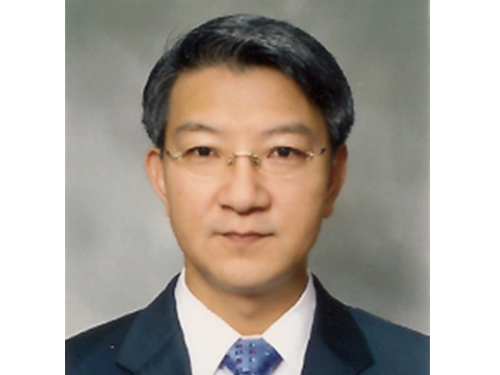 Distinguished Professor Sang Yup Lee Gives Special Lecture at Tianjin University, China
Distinguished Professor Sang Yup Lee from the Department of Chemical and Biomolecular Engineering at KAIST gave a special lecture at Tianjin University, China, on September 12, 2014.
The university has invited prestigious scholars and scientists including Nobel Prize laureates from all around the world to their program called the "BeiYang Lecture Series."
Professor Lee said:
"The lecture series has invited many eminent global leaders such as Dr. Steven Chu, who received the Nobel Prize in Physics in 1997 and also served the 12th United States Secretary of Energy. It is a great honor to participate in the program as a speaker. The university told me that in recognition of my research in the development of sustainable biochemical industry through systems metabolic engineering, I was invited to speak.”
Professor Lee presented his speech entitled “Production of Chemical Materials through Microorganism Metabolic Systems Engineering” and took questions from the audience.
Professor Lee developed the world’s most efficient microorganism and bioprocess such as succinate, butanol, and engineering plastic raw materials. In recent years, he has succeeded in producing a small quantity of gasoline through converting in-vivo generated fatty acids.
2014.09.16 View 10389
Distinguished Professor Sang Yup Lee Gives Special Lecture at Tianjin University, China
Distinguished Professor Sang Yup Lee from the Department of Chemical and Biomolecular Engineering at KAIST gave a special lecture at Tianjin University, China, on September 12, 2014.
The university has invited prestigious scholars and scientists including Nobel Prize laureates from all around the world to their program called the "BeiYang Lecture Series."
Professor Lee said:
"The lecture series has invited many eminent global leaders such as Dr. Steven Chu, who received the Nobel Prize in Physics in 1997 and also served the 12th United States Secretary of Energy. It is a great honor to participate in the program as a speaker. The university told me that in recognition of my research in the development of sustainable biochemical industry through systems metabolic engineering, I was invited to speak.”
Professor Lee presented his speech entitled “Production of Chemical Materials through Microorganism Metabolic Systems Engineering” and took questions from the audience.
Professor Lee developed the world’s most efficient microorganism and bioprocess such as succinate, butanol, and engineering plastic raw materials. In recent years, he has succeeded in producing a small quantity of gasoline through converting in-vivo generated fatty acids.
2014.09.16 View 10389 -
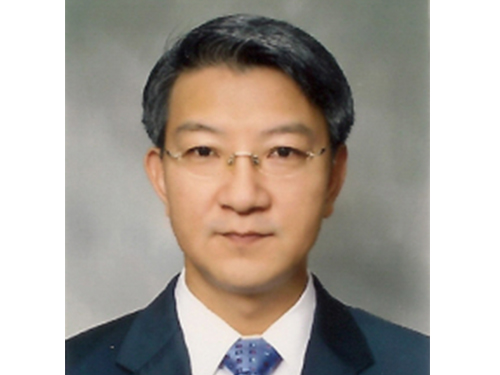 Distinguished Professor Sang Yup Lee Participates in the 2014 Summer Davos Forum
Distinguished Professor Sang Yup Lee from the Department of Chemical and Biomolecular Engineering, KAIST, was invited to lead four sessions at the Annual Meeting 2014, the World Economic Forum, also known as the Summer Davos Forum, which was held in Tianjin, China, from September 10th to 12th.
Two of the four sessions Professor Lee participated in were held on September 10th. At the first session entitled “Biotechnology Ecosystem,” he examined with other panelists the future of bioengineering in depth and discussed major policies and industry trends that will be necessary for the development of future biotechnologies.
Professor Lee later attended the “Strategic Shifts in Healthcare” session as a moderator. Issues related to transforming the health industry such as the next-generation genomics, mobile health and telemedicine, and wearable devices and predictive analytics were addressed.
On September 12, Professor Lee joined the “IdeasLab with KAIST” and gave a presentation on nanotechnology. There was a total of ten IdeasLab sessions held at the Summer Davos Forum, and KAIST was the only Korean university ever invited to host this session. In addition to Professor Lee’s presentation, three more presentations were made by KAIST professors on such topics as “Sustainable Energy and Materials” and “Next-generation Semiconductors.”
Lastly, Professor Lee participated in the “Global Promising Technology” session with the World Economic Forum’s Global Agenda Council members. At this session, he explained the selection of the “World’s Top 10 Most Promising Technologies” and “Bio Sector’s Top 10 Technologies” and led discussions about the “2015 Top 10 Technologies” with the council members.
The Davos Forum has been announcing the “World’s Top 10 Most Promising Technologies” since 2012, and Professor Lee has played a key role in the selection while working as the Chairman of Global Agenda Council. The selection results are presented at the Davos Forum every year and have attracted a lot of attention from around the world.
2014.09.15 View 13484
Distinguished Professor Sang Yup Lee Participates in the 2014 Summer Davos Forum
Distinguished Professor Sang Yup Lee from the Department of Chemical and Biomolecular Engineering, KAIST, was invited to lead four sessions at the Annual Meeting 2014, the World Economic Forum, also known as the Summer Davos Forum, which was held in Tianjin, China, from September 10th to 12th.
Two of the four sessions Professor Lee participated in were held on September 10th. At the first session entitled “Biotechnology Ecosystem,” he examined with other panelists the future of bioengineering in depth and discussed major policies and industry trends that will be necessary for the development of future biotechnologies.
Professor Lee later attended the “Strategic Shifts in Healthcare” session as a moderator. Issues related to transforming the health industry such as the next-generation genomics, mobile health and telemedicine, and wearable devices and predictive analytics were addressed.
On September 12, Professor Lee joined the “IdeasLab with KAIST” and gave a presentation on nanotechnology. There was a total of ten IdeasLab sessions held at the Summer Davos Forum, and KAIST was the only Korean university ever invited to host this session. In addition to Professor Lee’s presentation, three more presentations were made by KAIST professors on such topics as “Sustainable Energy and Materials” and “Next-generation Semiconductors.”
Lastly, Professor Lee participated in the “Global Promising Technology” session with the World Economic Forum’s Global Agenda Council members. At this session, he explained the selection of the “World’s Top 10 Most Promising Technologies” and “Bio Sector’s Top 10 Technologies” and led discussions about the “2015 Top 10 Technologies” with the council members.
The Davos Forum has been announcing the “World’s Top 10 Most Promising Technologies” since 2012, and Professor Lee has played a key role in the selection while working as the Chairman of Global Agenda Council. The selection results are presented at the Davos Forum every year and have attracted a lot of attention from around the world.
2014.09.15 View 13484 -
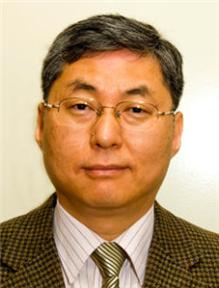 Kiseok Song, a Ph.D. candidate in the Electrical Engineering Department, receives the 2014 Marconi Society Young Scholar Award
Established
in 1974 to commemorate the eminent Italian inventor and electrical engineer,
Guglielmo Marconi, the Marconi Society has recognized significant contributions
in science and technology by awarding the Marconi Prize, with an annual USD
100,000 grant, to a living scientist who has made great advancements in
communications technology.
Along
with the Marconi Prize, the Society has been presenting the Young Scholars
Awards over the past six years to reward young and emerging scientists’ brilliant
academic and research achievements as well as their entrepreneurship. For this
year’s seventh Young Scholar Awards, a KAIST doctoral student was selected as
one of the two recipients.
Kiseok
Song, a Ph.D. candidate in the Department of Electrical Engineering, KAIST, has
been named as a 2014 Marconi Society Paul Baran Young Scholar. The Marconi Society said that Song was being recognized for "his
academic achievements and leadership in the field of communications and
information science,” according to a press release distributed by the Society on August 28, 2014.
Studying
under the advice of Professor Hoi-Jun Yoo of the Department of Electrical
Engineering at KAIST, Song has developed bio-medical System on a Chip (SoC)
such as smart wireless bio-medical systems combined with optimized SoCs,
compact bio-medical patch systems connected to smart phones, smart electro-acupuncture
and transdermal drug delivery, and multi-modal non-invasive glucose monitors.
The
press release quoted Professor Yoo’s comment on the meaning of Song’s research:
“All
of these bio-medical systems open a new healthcare paradigm to improve people’s
quality of life in combination with the current mobile smart phones.”
In
addition to Song, Himanshu Asnani, a Stanford Ph.D. candidate and system engineer
at Ericsson Silicon Valley, received the other award. The award
ceremony will be held at the Marconi Society’s annual award gala at the
National Academies of Science Building in Washington D.C., on October 2, 2014.
For
details, please read the following press release:
The
Marconi Society, Press Release, August 28, 2014
“Kiseok
Song Receives the 2014 Marconi Society Young Scholar Award”
http://www.marconisociety.org/press/2014Song.html
2014.09.08 View 9847
Kiseok Song, a Ph.D. candidate in the Electrical Engineering Department, receives the 2014 Marconi Society Young Scholar Award
Established
in 1974 to commemorate the eminent Italian inventor and electrical engineer,
Guglielmo Marconi, the Marconi Society has recognized significant contributions
in science and technology by awarding the Marconi Prize, with an annual USD
100,000 grant, to a living scientist who has made great advancements in
communications technology.
Along
with the Marconi Prize, the Society has been presenting the Young Scholars
Awards over the past six years to reward young and emerging scientists’ brilliant
academic and research achievements as well as their entrepreneurship. For this
year’s seventh Young Scholar Awards, a KAIST doctoral student was selected as
one of the two recipients.
Kiseok
Song, a Ph.D. candidate in the Department of Electrical Engineering, KAIST, has
been named as a 2014 Marconi Society Paul Baran Young Scholar. The Marconi Society said that Song was being recognized for "his
academic achievements and leadership in the field of communications and
information science,” according to a press release distributed by the Society on August 28, 2014.
Studying
under the advice of Professor Hoi-Jun Yoo of the Department of Electrical
Engineering at KAIST, Song has developed bio-medical System on a Chip (SoC)
such as smart wireless bio-medical systems combined with optimized SoCs,
compact bio-medical patch systems connected to smart phones, smart electro-acupuncture
and transdermal drug delivery, and multi-modal non-invasive glucose monitors.
The
press release quoted Professor Yoo’s comment on the meaning of Song’s research:
“All
of these bio-medical systems open a new healthcare paradigm to improve people’s
quality of life in combination with the current mobile smart phones.”
In
addition to Song, Himanshu Asnani, a Stanford Ph.D. candidate and system engineer
at Ericsson Silicon Valley, received the other award. The award
ceremony will be held at the Marconi Society’s annual award gala at the
National Academies of Science Building in Washington D.C., on October 2, 2014.
For
details, please read the following press release:
The
Marconi Society, Press Release, August 28, 2014
“Kiseok
Song Receives the 2014 Marconi Society Young Scholar Award”
http://www.marconisociety.org/press/2014Song.html
2014.09.08 View 9847 -
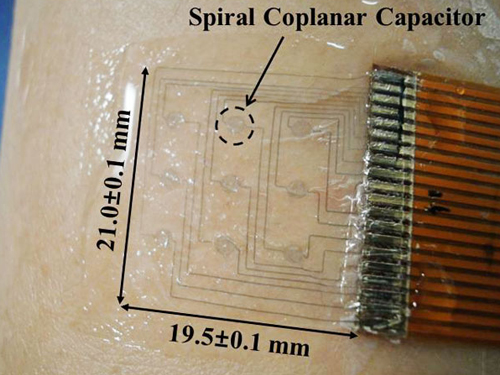 Newsweek: The Goosebump Sensor That Knows How You Feel
Newsweek covered the introduction of the goosebump sensor invented by Professor Young-Ho Cho of the Department of Bio and Brain Engineering at KAIST in an article dated July 27, 2014.
The article entitled “The Goosebump Sensor That Knows How You Feel” explains how the sensor works and reports on the current research and development trends in emotion-sensing technology.
Professor Cho’s research paper was originally published in the journal Applied Physics Letters on June 24, 2014, titled “A Flexible Skin Piloerection Monitoring Sensor."
Newsweek, July 27, 2014
“The Goosebump Sensor That Knows How You Feel”
http://www.newsweek.com/goosebump-sensor-knows-how-you-feel-260689
2014.07.28 View 9181
Newsweek: The Goosebump Sensor That Knows How You Feel
Newsweek covered the introduction of the goosebump sensor invented by Professor Young-Ho Cho of the Department of Bio and Brain Engineering at KAIST in an article dated July 27, 2014.
The article entitled “The Goosebump Sensor That Knows How You Feel” explains how the sensor works and reports on the current research and development trends in emotion-sensing technology.
Professor Cho’s research paper was originally published in the journal Applied Physics Letters on June 24, 2014, titled “A Flexible Skin Piloerection Monitoring Sensor."
Newsweek, July 27, 2014
“The Goosebump Sensor That Knows How You Feel”
http://www.newsweek.com/goosebump-sensor-knows-how-you-feel-260689
2014.07.28 View 9181 -
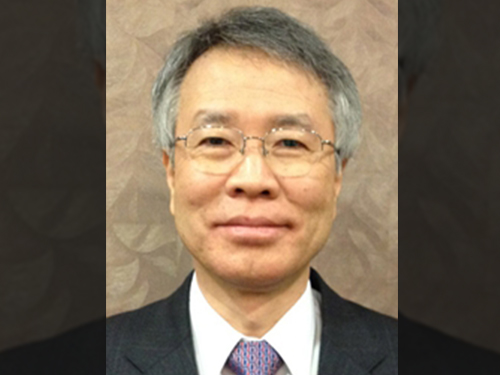 Professor Kyu-Young Whang Receives Contributions Award from ACM SIGMOD
Kyu-Young Whang, Distinguished Professor of Computer Science at KAIST, was the recipient of the 2014 ACM SIGMOND Contributions Award.
Founded in 1947, the Association for Computing Machinery (ACM) is the world’s largest educational and scientific computing society, delivering resources that advance computing as a science and profession.
SIGMOD is the Association for Computing Machinery’s Special Interest Group on Management of Data, which specializes in large-scale data management problems and databases.
Since 1992, ACM SIGMOND has presented the contributions award to one scientist who has made significant contributions to the field of database systems through research funding, education, and professional services. So far, 23 people including Professor Whang have received the award.
Professor Whang was recognized for his key role in the growth of international conferences and journals in the field of databases such as The VLDB Journal (The International Journal on Very Large Data Bases), VLDB Endowment Inc., IEEE Technical Committee on Data Engineering, and Database Systems for Advanced Applications (DASFAA). IEEE stands for the Institute of Electrical and Electronics Engineering.
For the full list of ACM SIGMOND Contributions Award recipients, please go to
http://www.sigmod.org/sigmod-awards/sigmod-awards#contributions.
2014.07.15 View 10219
Professor Kyu-Young Whang Receives Contributions Award from ACM SIGMOD
Kyu-Young Whang, Distinguished Professor of Computer Science at KAIST, was the recipient of the 2014 ACM SIGMOND Contributions Award.
Founded in 1947, the Association for Computing Machinery (ACM) is the world’s largest educational and scientific computing society, delivering resources that advance computing as a science and profession.
SIGMOD is the Association for Computing Machinery’s Special Interest Group on Management of Data, which specializes in large-scale data management problems and databases.
Since 1992, ACM SIGMOND has presented the contributions award to one scientist who has made significant contributions to the field of database systems through research funding, education, and professional services. So far, 23 people including Professor Whang have received the award.
Professor Whang was recognized for his key role in the growth of international conferences and journals in the field of databases such as The VLDB Journal (The International Journal on Very Large Data Bases), VLDB Endowment Inc., IEEE Technical Committee on Data Engineering, and Database Systems for Advanced Applications (DASFAA). IEEE stands for the Institute of Electrical and Electronics Engineering.
For the full list of ACM SIGMOND Contributions Award recipients, please go to
http://www.sigmod.org/sigmod-awards/sigmod-awards#contributions.
2014.07.15 View 10219